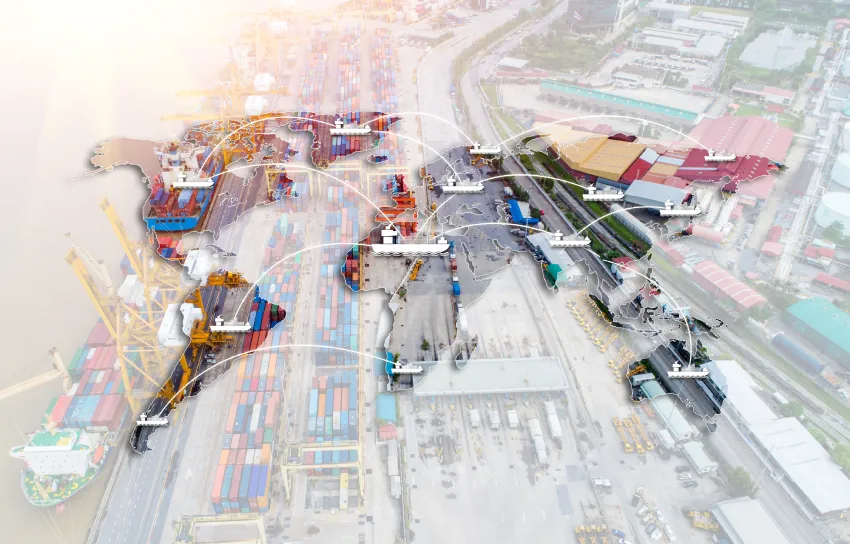In any international trade operation, one essential procedure is customs management. Located at borders, ports, and airports, customs are the public offices that regulate the flow of goods. Customs agents are responsible for inspecting them, whether imports or exports, and ensuring that the shipment meets all the necessary requirements to complete its journey. These are highly specialized procedures, so to avoid surprises, it’s important to have an expert partner in optimizing customs management for international trade.

Procedures in Customs Management for International Trade
The procedures within customs management ensure that goods entering and leaving a country comply with the applicable regulations. The basic element for customs operation is the import and export clearance, through which the necessary documentation is requested to carry out an international shipment.
The main procedures carried out in customs management for international trade include:
Goods inspection
Customs agents verify documentation and check that there are no issues with the goods.
Tariff and tax evaluation
Determines the applicable fees for each product.
Application of customs regulations
The goal is to prevent illegal activities such as smuggling, tax evasion, and trafficking in illegal items.
Facilitation of international trade
Customs agents also provide advice to importers and exporters.
What Services Do We Offer to Optimize Customs Management?
To ensure customs management doesn’t become a headache, the solution is to have an expert partner in customs services, like Startrans. We handle the applicable procedures for each shipment and are also specialists in managing customs warehouses.
Import and export customs clearance
Import and export customs clearance encompasses all the procedures and formalities that make international trade operations possible, as it controls, supervises, and authorizes the entry and exit of goods in a specific territory. When the import or export is for a set period of time and the goods return to their origin in the same condition they left, it is considered a temporary import or export.
Customs regimes are defined by the European Union Customs Code (CAU). If the transit of goods occurs within the EU, it is covered by the Absolute Free Trade Regime. However, if the origin or destination of the operation is outside the EU, export customs regimes, free circulation, or special regimes must be applied, as appropriate.
Free Circulation Customs Clearance
The customs regime for free circulation applies to goods from outside the EU that wish to be marketed in European countries after paying the corresponding tariffs.
Goods Clearance Under Special Regimes
When optimizing customs management for international trade, it’s important to know the different types of special customs regimes in detail.
Transit
Goods pass through EU territory, with origin or destination in countries adhering to the TIR Convention (international road transport of goods), ATA (temporary admission of goods), form 302 (NATO), or the postal system, belonging to a single customs territory. Transit is external if the shipment starts in a non-EU country and, after traveling through European territory, reaches another non-EU country. It is internal if the destination is within the EU but the goods must pass through a non-EU state.
Transformation
If non-EU goods are transformed within the EU, without the need for tariffs or commercial policy measures, this requires active processing. Passive processing applies when EU-origin goods are temporarily transferred outside the EU to be transformed. Upon return, they may be marketed under free circulation.
Reimportations
In customs management for international trade, goods sent to a non-EU territory may be returned if they arrive in a faulty condition, do not match the order, description, or for other reasons. In any case, they lose their status as community goods, and to return them, the reimportation procedure must be carried out.
Storage or Warehousing
Customs warehouses allow non-EU goods to be stored for a certain period without being subject to tariffs, taxes, or commercial policy measures. At Startrans, we are experts in managing customs warehouses and can advise you on the most suitable modality for your needs: temporary storage warehouse (ADT), public customs warehouse type A (DAP), non-public customs warehouse type A (DDA), or authorized location for export goods (LAME).
In addition, we handle all procedures related to customs inspections for pharmaceutical, phytosanitary products, SOIVRE certificates (Official Inspection, Surveillance, and Regulation Service for Exports), foreign health, as well as processing licenses and certificates with chambers of commerce, embassies, consulates, and other official organizations. Contact us and let us know your case.